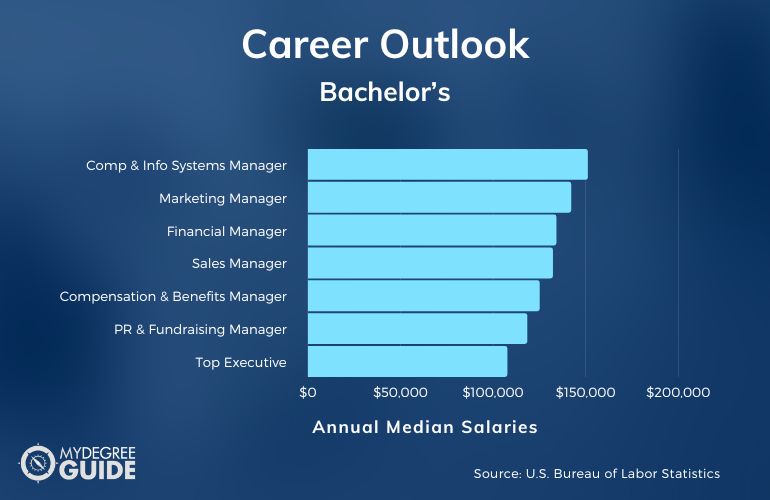Knowing the best degrees for adults returning to college can help you select a valuable major that may improve your career trajectory.

With a bachelor’s degree, you may qualify for new positions, receive more responsibilities, or increase your paychecks.
Editorial Listing ShortCode:
Going back to the classroom might feel like a major transition, but bachelor degree programs for working adults can help make the process easier. If you choose a school known for its adult degree programs, you may soon have one of these top degrees in hand.
Degrees for Adults Returning to College
For your college program, you may enjoy interesting, informative classes now and a strong job market after graduation.
You may want to take a look at some of these top degree programs for returning students to decide if one of these courses of study is right for you:
- Accounting
- Business
- Communication
- Criminal Justice
- Cyber Security
- Data Analytics
- Education
- Finance
- Healthcare Administration
- Human Resources
- Information Technology
- Management
- Marketing
You may want to explore your options to decide which program is right for you.
Accounting

If you appreciate organization and have an aptitude for numbers, you may make a great accounting student.
With this degree, you may become a bookkeeper, an accountant, an auditor, or a financial manager. As an accountant, you might work for a business, a tax firm, a government department, or a community organization.
Editorial Listing ShortCode:
In this program, you’ll likely take a number of accounting courses, such as intermediate accounting and advanced accounting. Other classes may cover taxation, auditing, and accounting ethics. There will probably be some courses addressing additional business disciplines as well.
If you choose to go on to get a master’s degree, you may qualify to become a certified public accountant (CPA).
Business

For a degree with any number of job possibilities, you may consider pursuing business studies. You might earn a generalist degree or choose a specialization, such as finance, human resources, information technology, or management.
Whether you choose a generalist or specialist degree, you’ll take an assortment of core business classes. They may include business law, management principles, and office technology systems.
Editorial Listing ShortCode:
Business majors may be qualified to advance into management positions. According to the Bureau of Labor Statistics, management jobs pay an average annual salary of $109,760. Potential job titles include administrative services manager and sales manager.
Communication

Those who are naturally gifted with words may excel in a communications program. During your studies, you may learn to craft powerful written or spoken messages to convey ideas on behalf of companies or organizations.
The classes for this major are likely to cover branding, public speaking, social media, and project management. You’ll probably discuss ethics for business and media personnel.
Editorial Listing ShortCode:
Communications majors go into a variety of fields. Some become writers, such as authors or technical writers. Others choose jobs in public relations or social media management. There may also be opportunities to work in fundraising, event planning, journalism, or advertising.
Criminal Justice

A passion for fairness may serve as the foundation for a criminal justice career. Your studies might prepare you to work in courts, law enforcement, corrections, or homeland security.
A criminal justice degree can also help prepare you to advocate for equity in policing and sentencing. You may study criminology, the court system, forensic investigations, and due process. Your classes may also cover criminal justice ethics and multicultural diversity.
Editorial Listing ShortCode:
Many criminal justice graduates work for government agencies at the local, state, and federal levels. According to the Bureau of Labor Statistics, the highest-paying police jobs are in federal organizations.
Cyber Security

Computer knowledge is in high demand in today’s workforce. Knowing how to protect networks and data from outside threats may make you a valuable asset to any organization.
Potential jobs include network architect, information security analyst, and network administrator. To earn this degree, you’ll learn about computer networks and information technology. You may also study one or more programming languages.
Editorial Listing ShortCode:
Classes like digital forensics, cybersecurity law and ethics, and system testing may teach you to how to make use of your computer knowledge in professional cyber security roles. Some programs include certification coursework to help prepare you for industry exams with the potential to bolster your resume.
Data Analytics

You may want to consider a degree in analytics if you have an aptitude for math and technology.
Analytics professionals organize and evaluate datasets to formulate insights that can inform business decisions. Career possibilities include management analyst, data analyst, and operations research analyst.
Editorial Listing ShortCode:
Your math classes will likely cover advanced topics like calculus, linear algebra, probability, and statistics. You may also study how to collect data, manage data sets both large and small, and perform analyses on the data. According to the Bureau of Labor Statistics, positions for operations research analysts are growing at a 25% rate.
Education

Majoring in education could give you the opportunity to continuously witness information come alive for students. Whether you’d prefer to teach preschoolers, high schoolers, or some age in between, becoming a teacher typically starts with a degree in education.
During your studies, you’ll likely learn about classroom management, learning theories, literacy, and student diversity. Some courses may address specific content areas, such as math or science.
Editorial Listing ShortCode:
Most education programs prepare students for teaching licensure, but it can be helpful to confirm whether a particular program meets your state’s requirements.
Finance

If you enjoy money matters but aren’t sure that accounting is right for you, then you may try finance instead.
Finance professionals evaluate money-related data to help organizations make critical business decisions. Jobs with this degree include financial manager and financial analyst.
Editorial Listing ShortCode:
For a bachelor’s degree in finance, you may take classes on accounting, economics, risk management, and global markets. Other courses would help equip you with business and management skills.
While many graduates work in business finance departments, others become personal financial planners. Whether you’re self-employed or work for a firm, pursuing Certified Financial Planner status may help you advance in that type of career.
Healthcare Administration

Healthcare is an in-demand field. To meet the need, health organizations need not only an increased number of clinical providers but also more trained administrators. Working in this field requires a knowledge of both medical practices and business administration.
As a healthcare administration student, you may study business topics like organizational theory, marketing, and human resources. For other classes, you may focus on healthcare-related studies, such as anatomy, epidemiology, reimbursement systems, and health equity.
Editorial Listing ShortCode:
Working as a medical or health services manager is a popular route for graduates. The Bureau of Labor Statistics says that those jobs are growing at a 32% rate.
Human Resources

Do you believe that people are what makes a company truly great? Do you have strong relational and problem-solving skills? If so, then you might be a good candidate for a career in human resources.
Since HR is a subset of business, you may take classes in business law, management, and communication. To prepare you for an HR-specific career, you may also study compensation, conflict resolution, training and development, and transition management.
Editorial Listing ShortCode:
You may begin your HR career as a human resources assistant or specialist. Gaining experience might put you on the path toward a job in human resources, compensation, or training management.
Information Technology

If you want a job that’s in demand across nearly any sector, then you may consider a degree in information technology. Many different organizations rely on the expertise of IT professionals who have the know-how to develop and maintain technology systems.
The jobs you can get with this degree may include computer support specialist, information security analyst, computer systems analyst, and database administrator. To prepare, you’ll often study computer networks, operating systems, programming languages, and computer security.
Editorial Listing ShortCode:
The curriculum list may include IT operations, cloud computing, and concepts in data management. Some classes may prepare you to earn industry certifications.
Management

If you know that you have what it takes to be a leader, then you may consider sharpening your skills and making your resume stand out by earning a degree in management.
You may increase your business savvy by taking classes like hiring practices, project management, and business analytics. The program may also cover organizational leadership and change management. You might get to take electives related to the specific business discipline in which you’d like to lead.
Editorial Listing ShortCode:
With a management degree, you might oversee administrative services or head up a department like HR or sales. Some graduates eventually earn roles as general managers, operations managers, or chief executives.
Marketing

You can put your creativity and problem-solving skills to work in a marketing program. Marketers are involved in brand management, advertising, consumer research, and product development.
Consumer behavior, sales, and advertising are some of the topics you may study. You may also learn how to conduct marketing research and make use of the results. Many programs include courses on navigating social media and other digital channels for marketing.
Editorial Listing ShortCode:
Lines of work for recent graduates include advertising sales and market research. Later, you might become a marketing, fundraising, or advertising manager. You may perform marketing work for corporations, nonprofit agencies, or healthcare organizations.
Why Online Degrees Are a Good Option for Working Adults

Whether your time is consumed with work tasks, family responsibilities, or a combination of the two, it may seem that there’s not much time left for academics.
While daytime classes and commutes to campus might be tough to squeeze into your schedule, you don’t have to give up on the idea of earning a degree. Many of the best flexible degree programs for adults returning to college are offered online.
Online colleges understand the needs of working adults and strive to accommodate students in this stage of life.
At many schools, the advantages of a bachelors degree online include:
- Access to classmates, professors, and tutoring services
- Accredited programs
- Accelerated 8 week classes
- Flexible start dates
- Night-and-day access to course materials
Online studies may allow you to participate in class and complete assignments on your own time. Plus, some accelerated degrees for working adults can be completed quickly so that you can wrap up studies and may begin reaping the benefits as soon as possible.
In addition to being convenient, online studies also lead to high-quality degrees. Just like campus-based programs, online colleges are eligible for regional accreditation. Many courses are led by faculty who teach both in-person and online classes.
Careers & Salaries for Bachelor’s Degree Holders

According to the Bureau of Labor Statistics, the average annual salary for people with bachelor’s degrees is $77,920. That’s about $40,000 higher than the average annual salary for people who have some college credits but no degree.
The following are high-paying jobs that you might be able to get with one of the top bachelor degree programs for working adults.
| Careers | Annual Median Salaries |
| Computer and Information Systems Manager | $151,150 |
| Marketing Manager | $142,170 |
| Financial Manager | $134,180 |
| Sales Manager | $132,290 |
| Compensation and Benefits Manager | $125,130 |
| Public Relations and Fundraising Manager | $118,430 |
| Top Executive | $107,680 |
| Medical and Health Services Manager | $104,280 |
| Information Security Analyst | $103,590 |
| Police Lieutenant | $92,970 |
| Personal Financial Advisor | $89,330 |
| Operations Research Analyst | $86,200 |
| High School Teacher | $62,870 |
Salaries can vary widely for any job category. The above figures represent median earnings across the country. Your pay may vary depending on your responsibilities, industry, area of the country, and experience. Additional degrees or certifications may increase your earning potential.
Admissions Requirements

Your return to the college classroom begins with being accepted into a program. Here’s what you might need to submit for the admissions process:
- Application form. This form will include your basic information and intended major.
- Application fee. Some colleges charge a small fee to review applicants’ paperwork.
- Proof of graduation. You may need to verify that you’ve completed high school or an equivalent program.
- Transcripts. You can ask previous colleges to send official transcripts that show what courses you’ve taken.
Some schools may ask for SAT or ACT scores as well, but that’s not always a requirement for programs designed for adult learners.
Accreditation

One way to know whether you’re choosing a great college is to consider its accreditation status. Regional accreditation is only given to colleges that meet a high set of standards.
Editorial Listing ShortCode:
Only a handful of agencies can award regional accreditation. Both online and on-campus schools are eligible to be regionally accredited. With a degree from a regionally accredited school, it’s more likely that you’ll be able to transfer your credits elsewhere, get into a graduate program, or earn a leadership role in your field.
Financial Aid and Scholarships

To get started with financial aid, you can fill out the Free Application for Federal Student Aid (FAFSA).
Government loans with low interest rates may allow you to defer some of your payments. Grants may provide free tuition help that you won’t have to pay back, if you qualify. You can look into assistance programs from your state as well as the federal government.
You may be able to secure funding from private sources too. Scholarships programs abound, so it’s strategic to apply for several. Your employer may contribute to your education costs as well.
Can I Get College Credit for My Work Experience or Life Experience?

Yes, many schools will waive some of the course requirements for students who can demonstrate their familiarity with the material. To show what you know, you might need to take exams or submit a portfolio.
Military training and industry certifications can be helpful as well. Receiving credit for prior experience may help you get through a degree program more quickly. Plus, having a few classes waived may reduce your overall tuition bill. Awarding credit for prior experience is done on a case-by-case basis and at the college’s discretion.
Will My Previously Earned College Credits Transfer?

Returning adults may be able to receive credit for classes taken at other schools. Transferring in credits may save you both time and money.
To qualify, your previous coursework will probably need to come from a regionally accredited institution. Also, the courses should be similar in nature to those included in the curriculum for your new bachelor’s degree program. There’s usually a minimum grade that you must have earned in order for a class to count for transfer credit.
An admissions advisor can help you navigate your new college’s process for granting credit for previous coursework.
Is It Worth Going Back to College?

Yes, earning a college degree is worth it for many students. According to the Bureau of Labor Statistics, jobs requiring a bachelor’s degree for entry are set to grow at 6% over the next 10 years, faster than the average job growth for all occupations.
Common careers include financial manager, information security analyst, marketing manager, high school teacher, and medical and health services manager. Whether you’re hoping to get promoted in your current industry or break into a new line of work, college has the potential to open new doors for you.
Going Back to College as an Adult

It’s not too late to earn a college degree, but you may need to find a program that works for your schedule. As a busy adult with family responsibilities or a demanding job, you may not be able to join a traditional college program.
Instead, you may benefit from a program designed for adults returning to college. Bachelor’s degrees online from accredited schools can be some of the best options. This is often the case whether you are interested in an online business degree, an online computer science degree, or even an online theology degree.
Programs tailored to working professionals often include flexible schedules, accelerated terms, and year-round start dates.
Are you ready to complete your college education? If so, you can start exploring online schools that offer the best degree programs for adults returning to college.

